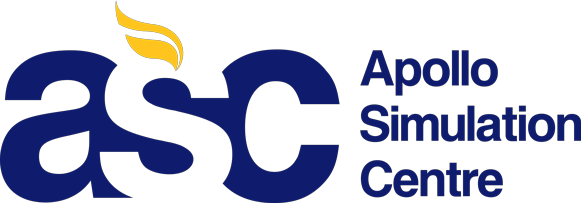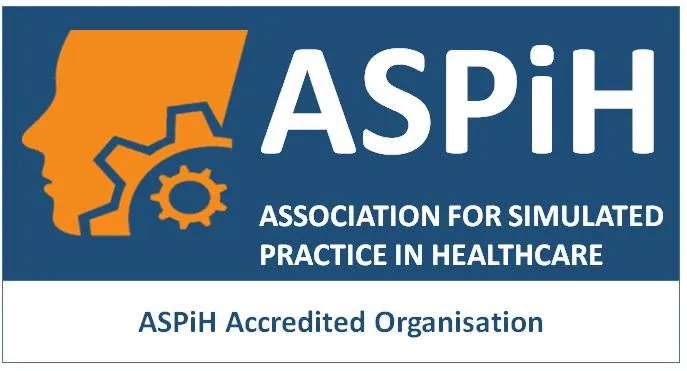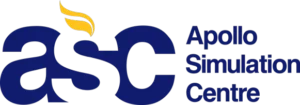AHA Basic Life Support and Advanced Cardiac Life Support
* Registrations will close 15 days prior to the course commencement date *
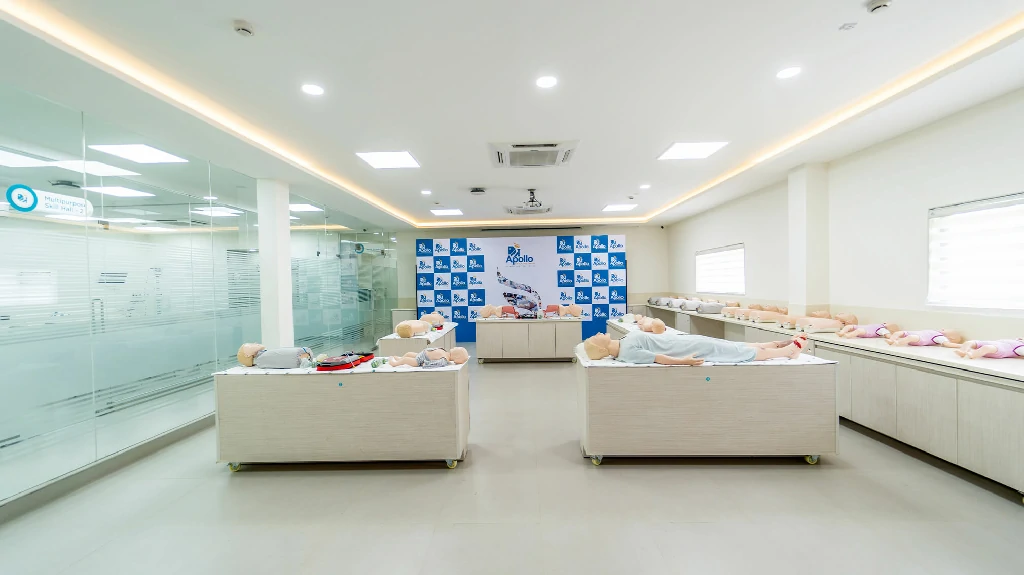
Learning Outcomes
By the end of the course, participants will be able to:
- Perform high-quality CPR for cardiac arrest situations.
- Recognise shockable rhythms and use a defibrillator to deliver shocks promptly.
- Administer medications during arrest at the appropriate dose and timing.
- Continuously assess the quality of CPR, monitor the patient’s response, and provide feedback to the team.
- Recognise and manage bradycardias and tachycardias that may lead to patient deterioration.
- Perform cardioversion.
- Demonstrate effective communication as a member or leader of a high-performance team.
- Understand the role of team dynamics in overall performance.
- Discuss the early recognition and management of acute coronary syndrome, including proper disposition.
- Discuss the early recognition and management of stroke, including appropriate disposition.
- Grasp the elements of effective team dynamics.
Course Description
This course on Basic and Advanced Cardiac Resuscitation enhances cardiac arrest outcomes by equipping individuals with the skills to deliver appropriate treatment and function as part of a highly effective team.
New Batch Starts on
Contact Us
Course Duration:
2 days
 Online modules
Online modules Access period: 1 month
Access period: 1 month Clear concepts
Clear concepts Manikin-to-student ratio of 1:3
Manikin-to-student ratio of 1:3 Interactive discussions
Interactive discussions Objective-structured clinical examination
Objective-structured clinical examination Certificate of completion
Certificate of completion
Curriculum
Knowledge
Reading Material
Pre Course Work and Assessment
- BLS and ACLS precourse work involves student, reviewing course content of AHA through online videos
- Released 15 days – 1 month prior to contact course
Skills
2-day contact program
Assessment
Certificate
Participants will receive a course completion certificate by AHA once they clear required assessment.
Sample BLS Course Agenda With Optional Lessons
12 students, 2 BLS Instructors; student-instructor ratio 6:1; student-manikin ratio 3:1; total time: approximately 4 hours and 15 minutes (with breaks)
| Time | Lesson |
| 8:00-8:05 | Lesson 1: Course Introduction |
| 8:05-8:35 | Lesson 2: 1-Rescuer Adult BLS
Part 1: Adult Chains of Survival Part 2: Scene Safety, Assessment, and Adult Compressions Part 3: Pocket Mask Part 4: 1-Rescuer Adult BLS |
| 8:35-8:55 | Lesson 3: AED and Bag-Mask Device
Part 1: AED Part 2: Bag-Mask Device |
| 8:55-9:04 | Lesson 4: 2-Rescuer Adult BLS |
| 9:04-9:14 | Lesson 5: Special Considerations
Part 1: Mouth-to-Mouth Breaths Part 2: Rescue Breathing Part 3: Breaths With an Advanced Airway Part 4: Opioid-Associated Life-Threatening Emergency Part 5: Maternal Cardiac Arrest |
| 9:14-9:40 | Lesson 6: High-Performance Teams
Part 1: Team Dynamics Part 2: High-Performance Teams Part 3: High-Performance Teams Activity (Optional) |
| 9:40-10:00 | Lesson 6A: Local Protocols Discussion (Optional) |
| 10:00-10:10 | Break |
| 10:10-10:20 | Lesson 7: Child BLS
Part 1: Pediatric Chains of Survival Part 2: Child BLS Part 3: 2-Rescuer Child CPR |
| 10:20-10:40 | Lesson 8: Infant BLS
Part 1: Infant BLS Part 2: Infant Compressions Part 3: Bag-Mask Device for Infants Part 4: 2-Rescuer Infant CPR Part 5: AED for Infants and Children Less Than 8 Years of Age |
| 10:40-10:47 | Lesson 9: Relief of Choking
Part 1: Adult and Child Choking Part 2: Infant Choking |
| 10:47-10:52 | Lesson 10: Conclusion |
| 10:52-11:32 | Lesson 11: Skills Test
Part 1: Adult CPR and AED Skills Test Part 2: Infant CPR Skills Test |
| 11:32-11:57 | Lesson 12: Exam |
| 11:57-12:12 | Lesson 13: Remediation
Part 1: Skills Testing Remediation Part 2: Exam Remediation |
Sample Agenda for ACLS Course Plus BLS Card*
12 Students, 2 ACLS Instructors; approximately 13 to 14 hours with breaks
| Day 1 | ||
| 8:30 Lesson START: Welcome, Introductions, and Course Administration
8:45 Lesson 1: ACLS Course Overview and Organization 8:55 Lesson 1A: Infant CPR and Bag-Mask Ventilation Practice* 9:10 Lesson 1B: Infant CPR Testing* 9:30 Lesson 1C: Adult/Child Choking* 9:35 Lesson 1D: Infant Choking* 9:40 Lesson 1E: BLS Exam |
||
| Divide class into 2 groups |
Lesson 2 Learning/Testing Station: High-Quality BLS |
Lesson 2 Learning/Testing Station: High-Quality BLS |
| 10:10 | Group 1 | Group 2 |
| 10:55 Break | ||
| Divide class into 2 groups |
Lesson 3 Learning/Testing Station: Airway Management |
Lesson 3 Learning/Testing Station: Airway Management |
| 11:10 | Group 2 | Group 1 |
| One large group (or 2 small groups)
11:55 Lunch 12:50 Lesson 4: Technology Review |
||
| Divide class into 2 groups |
Lesson 5 Learning Station: Preventing Arrest: Bradycardia |
Lesson 6 Learning Station: Preventing Arrest: Tachycardia (Stable and Unstable) |
| 1:05 | Group 1 | Group 2 |
| 2:05 | Group 2 | Group 1 |
| One large group (or 2 small groups)
3:05 Break 3:20 Lesson 7: High-Performance Teams |
||
| Divide class into 2 groups |
Lesson 8 Learning Station: High-Performance Teams: Cardiac Arrest and Post–Cardiac Arrest Care |
Lesson 8 Learning Station: High-Performance Teams: Cardiac Arrest and Post–Cardiac Arrest Care |
| 3:50 | Group 1 | Group 2 |
| 6:10 End of Day 1 | ||
| Day 2 | ||
| Divide class into 2 groups |
Lesson 9 Learning Station: High-Performance Teams: Megacode Practice |
Lesson 9 Learning Station: High-Performance Teams: Megacode Practice |
| 8:30 | Group 2 | Group 1 |
| 10:50 Break | ||
| Divide class into 2 groups |
High-Performance Teams: Megacode Testing and Megacode Testing Details
Lessons T2-T4 |
High-Performance Teams: Megacode Testing and Megacode Testing Details
Lessons T2-T4 |
| 11:00 | Group 1 | Group 2 |
| One large group (as students finish the Megacode Test)
12:15 Exam (T5-T6) 1:00 Remediation/Class Ends |
||
*See BLS Lesson Plans in the BLS Instructor Manual.
Contact Course
- Priority for hands-on practice and skill training
- Hands-on defibrillator training
- Rhythm identification
- Cardiac arrest care and postcardiac arrest care
- Stroke and ACS algorithms
- Manikin-to-student ratio of 1:3
- Decision making
- Team training
- High-fidelity scenario-based training will be given to enable teams to perform effectively
Course Convenor

Dr. Dhavapalani Alagappan
Clinical Director,
Emergency Department,
Apollo Hospitals, Chennai
Faculty
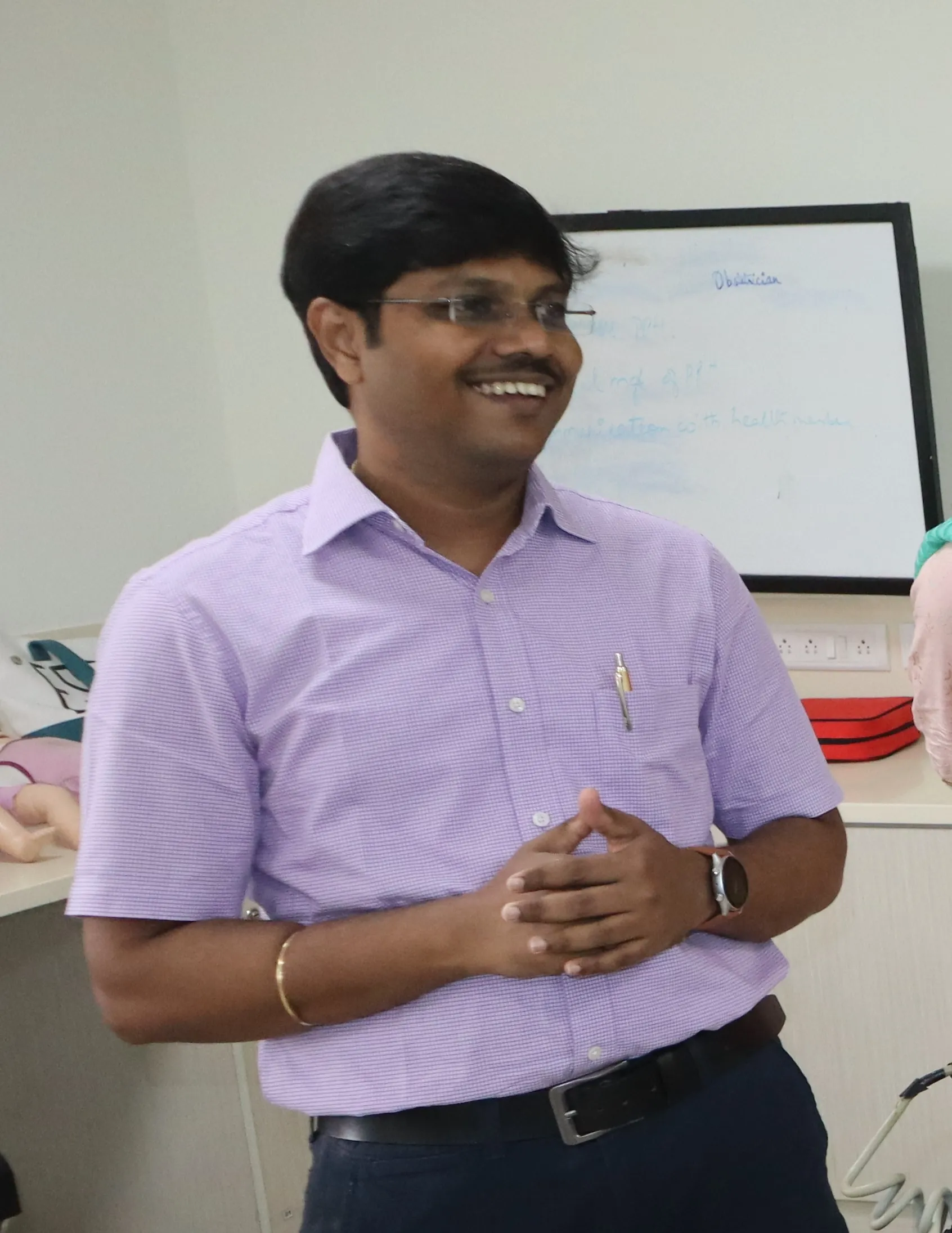
Dr. Bhaskar D
Senior Consultant,
Department of Emergency Medicine,
Apollo Hospitals, Chennai

Dr. Devayani R
Consultant,
Department of Emergency Medicine,
Apollo Hospitals, Chennai

Dr. Madhumitha S
Consultant,
Department of Emergency Medicine,
Apollo Hospitals, Chennai
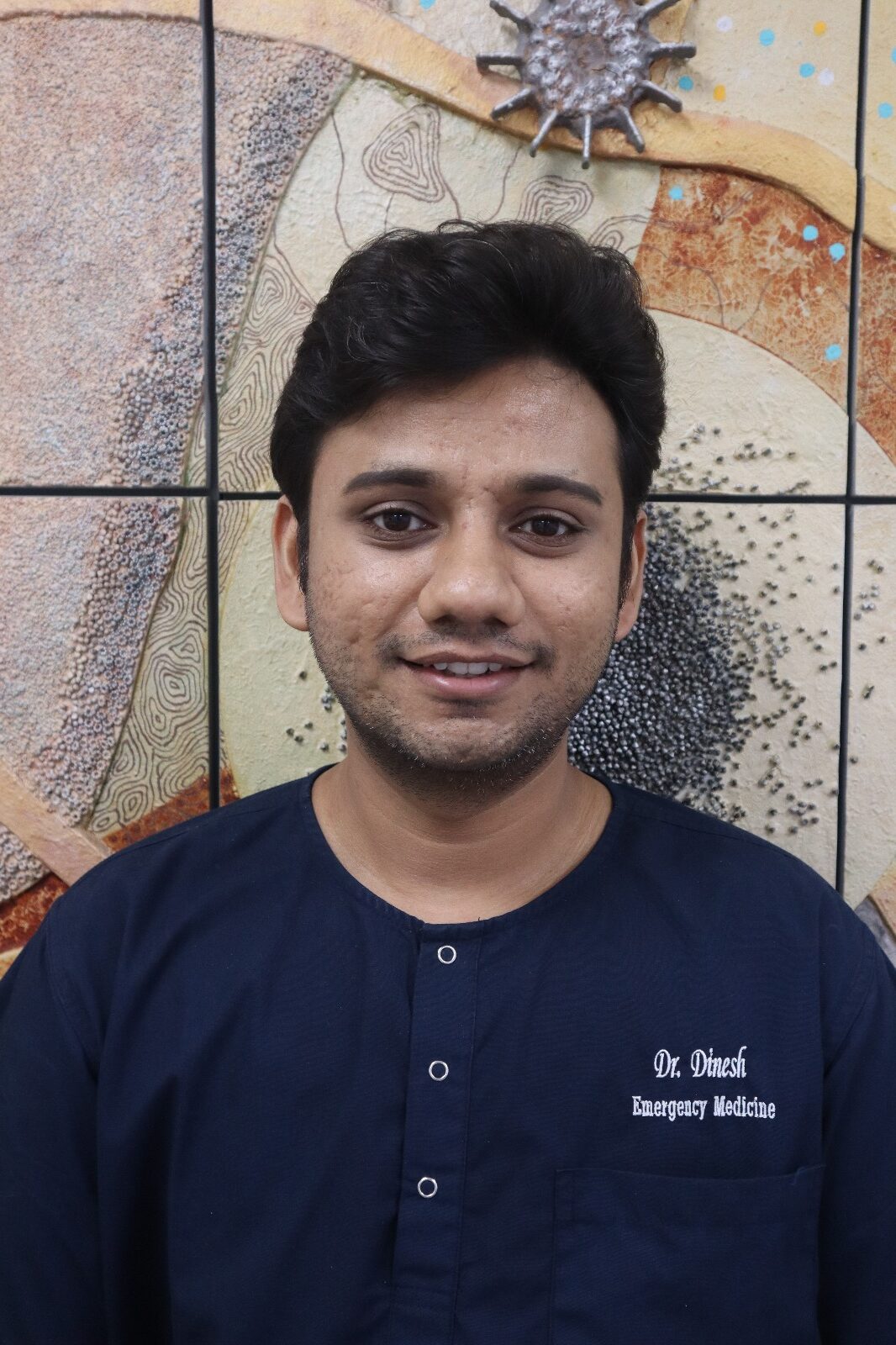
Dr. Dinesh Prabhu B
Junior Consultant,
Dept of Emergency Medicine,
Apollo Hospitals, Chennai

Dr. Srinivasan MD
Junior Consultant,
Dept of Emergency Medicine,
Apollo Hospitals, Chennai

Dr. Pavithra Raghavan
Junior Consultant,
Department of Emergency Medicine,
Apollo Hospitals, Chennai

Dr. Selvakumar CV
Consultant,
Department of Emergency Medicine,
Apollo Hospitals, Chennai

Dr. Lavanya V
Junior Consultant,
Department of Emergency Medicine,
Apollo Hospitals, Chennai

Dr. Gopala Krishnan M
Senior Registrar,
Dept. of Emergency Medicine,
Apollo Hospitals, Chennai

Dr. Sultan Naina Mohammed
Senior Consultant,
Dept. of Emergency Medicine,
Apollo Hospitals, Chennai

Ms. Durgadevi Elumalai
Simulation Instructor,
Apollo Simulation Centre,
Chennai

Dr. Thilaka Muthiah
Consultant,
Department of Anaesthesia,
Apollo Hospitals, Chennai.
Who is This Course for?
- Interns
- Registrars
- Postgraduates
- Practising doctors
- Nurses
- Health Care Providers
Why ASC
- Unparalleled Technological Infrastructure
- Expert Faculty with Real World Experience
- Innovative Learning Methodologies
- Comprehensive Curriculum
- Learner faculty ratio and learner manikin ratio is well maintained
🔔 Registrations will close 15 days prior to the course commencement date

The Apollo Simulation Centre (ASC) is a medical simulation teaching and training institute located at the Apollo Vanagaram campus.
Location
Contact Info
64, Vanagaram to Ambattur, Yadaval Street, Off Poonamallee High Road, Vanagaram, Chennai-600095, Tamil Nadu
sales@apollosimulation.com help@apollosimulation.com
Copyright © 2024 Apollo Simulation Centre. All Rights Reserved.

